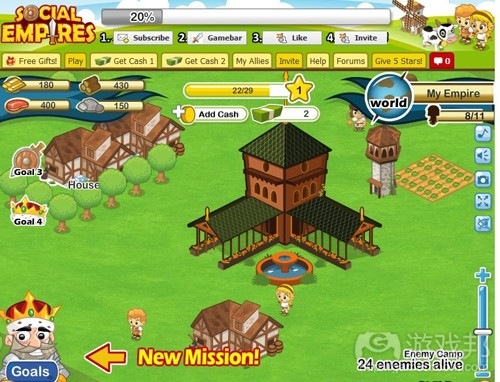Playdom预测未来社交游戏发展趋势
作者:Leigh Alexander
数年以来,Playdom的Steve Meretzky和Dave Rohrl经常在奥斯汀的GDC Online大会上概述社交游戏的年度趋势,但是今年可以报道的趋势相对较少。
Meretzky说道:“今年我们注意到的趋势是,行业的节奏似乎已经发生了改变,进度放缓了。”
但是,这两个人认为,这是种积极的态势,展示了该媒介的成熟,未来还可以继续获得成长。Meretzky将社交游戏比作“叛逆的青春期少年”,不再是个孩子,但处于长大未成人的状态。
改变迅速的Facebook游戏领域与行业中其他领域不同,发展并不是由新的游戏发布来推动。在目前Facebook前50的游戏中,只有6款是去年发布的游戏,2/3的游戏已经面世1年多。而在主机游戏领域,目前排名前10的游戏中,没有一款游戏的年龄超过1岁。
Rohrl说道:“在这些超过1年的游戏中,许多游戏出Zynga之手。”该Facebook游戏巨头似乎在耐久性方面做的很不错,但是诸如《Petville》、《Fishville》和《Roller Coaster Kingdom》之类的游戏似乎并不乐观,其他游戏仍然可以成长并获得用户。对Rohrl而言,这种非同寻常的悬殊性是社交游戏本质的绝妙范例,因为此类游戏的构建需要长期的服务,对实时运行的专注是必要的。
尽管许多人认为Facebook的病毒性渠道的效果有所下降,这缩小了社交游戏成长的空间,因为此类游戏需要依靠通知和用户互动来发展用户数量并且保持玩家的积极性。但是据Rohrl所述,这种说法纯属子虚乌有。Facebook的布局和信息交流发生改变,但是其病毒式渠道仍然是个很棒的用户获取渠道。
他说道:“近期,Facebook确实通过某些方式来改善病毒渠道,比如你在玩游戏时会在屏幕右侧看到好友正在玩何种新游戏的曝光通知。”
Zynga的《CityVille》完全可以体现出病毒式传播的优势,游戏中发生的每个事件或成就都会鼓励用户分享信息或寻求好友帮助。
Rohrl说道:“去年,我们说过游戏都应当借鉴农场的模式。某些游戏机制可以在农场背景下发挥极大的作用。”农场让玩家可以种植并且持续访问游戏,需要管理供应链、制作东西和收获作物。这是种鼓励玩家重返游戏的绝妙方法。
但是有些人过度地使用这种方法,而且做法并不恰当。他说道:“游戏设计师时常会盲目地应用这些机制,尝试将这种方法复制到所有的Facebook游戏上。”这种做法后来却形成不自然的效果。
随后Zynga的《FrontierVille》问世,这款游戏的机制更加完善。游戏引进的能量系统成为社交游戏中的黄金准则。《FrontierVille》中的许多机制都符合开发边境地区的现实场景。这些增加了玩家可能面临挑战的深度和广度。
开发商总是想去借鉴那些成功的机制,因为这可以使得风险和学习时间最小化,这可以让他们专注于社交游戏中最主要的方面:吸引和获取用户。
Meretzky说道,这些仿制产品使得竞争更加激烈,直接有助于提升社交游戏的质量。未来社交游戏的质量将更好,因为开发商会尝试通过润色、更好的视觉效果和产品价值以及健全的游戏功能来突出自己的游戏。虽然《Words With Friends》等视觉效果较差的简单游戏仍然繁荣,但是这款有着300万日活跃用户的游戏仍然位于Zynga表现最差的产品之列。
流行游戏会添加不同的场景,就像Zynga的《Empires and Allies》会向玩家提供地图化的视觉效果,让他们产生正在驶向其他地方的想法。这并非是新鲜的,其他类型的游戏之前也通过地点描述来呈现这种设计,但是世界范围和大小的重要性现在已经成为开拓视觉效果更加丰富的现代RPG类游戏的关键。
这些扩展会增加游戏中多数硬核玩家的留存率。Rohrl说道:“但是事实上,社交游戏中有个人尽皆知的小秘密——尽管玩家对你的业务很重要,但是付费玩家才是你的盈利来源。”而新的游戏规则可以更加有效地从所谓的“鲸鱼用户”手中获取金钱,这种设计为用户提供了更加独特的道具和战斗优势。
尽管PopCap凭借《宝石迷阵闪电战》在Facebook上获得了成功,但是在该平台上探索休闲游戏市场的公司仍然很少。Meretzky表示,这种情况可能会发生改变。Bingo游戏和老虎机等已经开始在Facebook上出现,流行的隐藏物品题材游戏也已经登录该平台,比如《Gardens of Time》和《Mystery Manor》。
为何经典游戏会突然涌现在Facebook上而且自发布其便获得稳定和持续的成长呢?Meretzky说道:“一方面的原因是,玩家类别几乎相同。”Facebook用户和传统休闲玩家几乎一致。那些已经在使用该社交网络的玩家很有可能玩那些已经熟知的游戏。对于开发商而言,该游戏玩法已被证实有效,因而其有机会通过这种方式来赢得用户青睐。
2010年,Facebook游戏中体现竞争性的方式是排行榜,玩家可以看到好友中谁是最成功的,甚至他们还可以帮助好友。Rohrl认为,这种“和平友爱”的时代已经过去了。去年,战斗和塔防题材的游戏已经开始出现。但是过去几个月来,《Army Attack》、《Empires and Allies》和《Social Empires》等一大波休闲题材游戏涌现平台,这些游戏看起来更像是战略游戏。
Rohrl说道:“战斗化的设计可以让开发商获得大笔收入。”那些乐衷于攻击他人的玩家也会愿意在此过程中花钱打造自己的军队。那些偏爱传统战略题材游戏的玩家也会更投入游戏,因而他们会花更多的钱。
尽管品牌更容易获取用户,但是品牌游戏的表现仍然不如预期,获得IP游戏授权的成本也更为昂贵。但是,那些为众人熟知的品牌也开始进军这个平台,比如EA的《FIFA》和《Madden NFL Superstars》系列。《Monopoly Millionaire》是经典桌游的Facebook版本,Area/code的CSI: Crime City(游戏邦注:该游戏由Ubisoft发行)也能够满足某些粉丝的诉求。
获得最大成功的是《The Sims Social》,该游戏已经成为轰动市场的巨作,这证实了只要执行恰当的题材都有成功的机会。
尽管文字RPG曾经是Facebook游戏中最为流行的形式,但它已开始逐渐衰退。不过RPG却仍然活跃在平台上,比如游戏《Mafia Wars 2》、《It Girl》和《Crime City》,玩家可以在游戏中进行犯罪活动或者逛街。诸如《Monster Galaxy》之类的游戏借鉴了《口袋妖怪》等主机游戏的怪物收集机制。小型地下城探索游戏也已经出现,比如Playdom的《Deep Realms》和《Monster Hero》。
未来RPG类型游戏将会朝哪个方向发展呢?Rohrl预测,多元化预计将会继续涌现,RPG游戏会继续繁荣发展。怪物收集的形式将会有更多的发展机会。
但是Rohrl警告,他对Facebook上的地下城探索式的游戏将会面临的挑战表示担忧,这种类型的游戏对Facebook相对缺乏吸引力。他说道:“Facebook市场上的用户似乎并没有需要此类游戏的念头。”
许多公司将社交游戏视为印钞机,游戏公司可以轻易地利用Facebook来构建品牌和增加盈利。但是Meretzky警告称这是个极为危险的想法。
他补充道:“开发社交游戏是非常艰辛的工作。此类游戏有着许许多多需要注意的地方,而且你需要在所有方面都采用正确的做法,将所有的机制汇总起来并将其润色,营造出有趣的体验。如果你没有为此等工作做好准备,没有为可能经历的多次失败做好准备,那么你不应当去尝试开发此类游戏。”(本文为游戏邦/gamerboom.com编译,如需转载请联系:游戏邦)
GDC Online: Playdom’s Rohrl, Meretzky On The Year’s Biggest Social Gaming Trends
Leigh Alexander
Playdom’s Steve Meretzky and Dave Rohrl have presented overviews on the year in social games at Austin’s Game Developers Conference Online for a few years now, yet this year, there were fewer trends to report.
“One meta-trend that we noticed this year is… we had a lot fewer trends on our list,” Meretzky (pictured) began. “It seemed like the pace had changed, in the industry, by slowing down.”
However, this is something of a positive sign, indicative of maturity in the medium and a period of growth and refinement ahead, the pair believe. Meretzky compared social gaming to an “awkward adolescent,” no longer a child, yet not yet an adult.
In the fast-changing Facebook game space, unlike elsewhere in the industry, evolution is not driven by hot new releases — of the current top 50 Facebook games, only six were released in the last year, and two-thirds of them are more than a year old. Compare that to the console space, where zero of the current top ten titles are more than a year old.
“Many of these games that are more than a year old are Zynga games,” Rohrl notes. The Facebook giant may have a gift for durability, but titles like Petville, Fishville and Roller Coaster Kingdom have seen massive user attrition, while other titles have been able to grow and gain users. This unusual disparity, for Rohrl, is a “perfect example” of the nature of the beast, where building games as a long-term service with a focus on live operations is essential.
Although many believe Facebook’s viral channels have seen a mass reduction that’s strangling the potential of social games — which generally rely on notifications and user interactions to grow userbases and keep players active — this is something of a myth, according to Rohrl. Facebook’s layout and information exchange has changed, but its viral channels are still a good acquisition channel.
“Recently… Facebook has actually been easing up on the viral channels in some ways, in example with discovery posts that let you know of new games that your friends are playing, or the live-streaming channel that appears on the right side of the screen while you’re playing games,” he says.
Zynga’s CityVille is the prime example of the wellness of virality — to say that every single occurrence or achievement in the game prompts the user to share info or request help is not much of an exaggeration.
“Last year, we came here and told you that everything had to be a farm,” Rohrl says, meaning “there’s a certain set of mechanics that make a lot of sense in the farming context.” Farms give players things to plant, tend, and continually visit, a supply chain to manage and things to make, do, and give from the harvested goods. It’s an easy way to encourage players to keep returning to the game.
But it was overdone, and not always well: “Game designers often slavishly applied these mechanics,” he says. “…to try to replicate what they believed was a natural ‘secret recipe’ for Facebook games.” The result was strange unnatural behaviors, like meals that took 20 hours to cook or tires that would “spoil” if you didn’t pick them up from the store in time.
Then came Zynga’s FrontierVille, more substantial mechanically. It introduced the energy system that’s become gold standard among social games, and the constantly-encroaching debris and plants that needed grooming. FrontierVille introduced enemies to stave off, and other mechanics that were natural follows on the premise of forging a path across the frontier. These increased the breadth of immersion and challenge that was possible for players.
Developers so readily borrow successful mechanics because it minimizes risk and learning curve because it allows them to focus on what’s primary in social games: audience engagement and acquisition, Rohrl says.
All of this imitation makes competition much stiffer, and directly benefits the quality of the games, says Meretzky. In the year ahead, the quality of social games can be expected to make meaningful, as developers try to differentiate themselves through polish, better visuals and production values, and robust feature sets. While simple games with low visual sophistication like Words With Friends still thrive, even with some 3 million daily active users that title is still among Zynga’s weakest performers.
Popular games are adding locations — as in Zynga’s Empires and Allies, which offers players the visual of a map to give them the idea that they’re traveling to different places. This isn’t necessarily new; older social games like the mob and sorority-type models offered sense of place with location descriptions and even different currencies, but now the importance of world scope and size has begun to make its way into the far more visually-rich world of modern RPG-like games.
These extensions increase retention among games’ most hardcore players. “But really, one of the dirty little secrets of social games is that while players are important to your business, payers are your business,” says Rohrl. And new locations with different rules help monetize the so-called “whales” better, as they create opportunities to offer unique items and combat advantages.
Although PopCap found success with Bejeweled Blitz on Facebook, few other companies have explored casual games on the platform. Expect this to change, Meretzky says. Bubble-popping, bingo games, Collapse-alikes, and slot machines have begun to appear on Facebook, and the enormously popular hidden object genre has arrived with Gardens of Time and Mystery Manor.
Why this sudden explosion of classic gaming on Facebook — and the sustained and continuous growth such titles have seen since launch? “For one thing, demographics are almost insane,” Meretzky says. The overlap between the Facebook audience and the traditional casual audience is enormous. Players already using the social network are drawn to play games they’re already familiar with, attracted to the immediacy. For developers, the gameplay is already proven and gives developers opporunities to explore acquisition instead of iterating.
In 2010, competition in Facebook gaming was a leaderboard bar that let players see who among their friends was most successful — even as it allowed them to help their friends. But the era of “peace and love” is over, Rohrl suggests. Last year, titles that incorporated combat and tower defense began to creep onto the fringe. But in the last few months, a wave of casual titles like Army Attack, Empires and Allies and Social Empires emerged that looked just a little more like strategy titles than before.
“Fighting can be very lucrative,” says Rohrl. Players who enjoy attacking one another also like spending money on their way to building their armies. Players that prefer more sophistication, or to games that resemble traditional strategy titles even a little bit tend also to be more devoted players, and thus they spend more.
Although they make user acquisition much easier, branded games have performed below expectations. Licensed IP games are also more expensive, require approvals from the brand’s owner, and are under enormous pressure from users. Nonetheless, recognizable brands are beginning to make its way to the platform, as with EA’s FIFA and Madden NFL Superstars titles. Monopoly Millionaire is a twist on the classic board game designed for Facebook, and Area/code’s (pre-Zynga, published by Ubisoft) CSI: Crime City sought to appeal to fans of the show.
The biggest and most successful example is The Sims Social, which has been an enormous hit — proving there are opportunities for the right properties when they’re well-executed.
Where once text RPGs were the most popular type of Facebook game, they saw an enormous decline. But RPGs are still alive on the platform with games like Mafia Wars 2, It Girl and Crime City, that let players commit crimes or go shopping. Other games like Monster Galaxy have mined the monster-collection mechanics from games of the console world like Pokemon. And light dungeon crawlers like Playdom’s Deep Realms and Monster Hero have also emerged.
Where do RPGs go from here? The healthy diversification is expected to continue, and isometric RPGs will continue to flourish, Rohrl predicts. “I’m absolutely shocked that there’s no isometric vampire RPG on the platform,” he adds. There’s more opportunities to really capture the monster-collector format.
But “I would worry” about taking on the challenge of creating dungeon crawlers on Facebook, he warns. Traction seems to be difficult in that place. “The Facebook market simply does not have an appetite for this kind of gameplay.”
Lots of companies look at social games as a “license to print money”; that game companies can easily leverage Facebook to build brands and augment revenues. But this is a dangerous perspective, Meretzky warns.
“Developing social games is really, really hard work. There are lots of moving parts and you need to get them all correct, not just some of them… and you have to put it all together into a package that’s polished and fun,” he adds. “If you’re not prepared to do that, and you’re not prepared to publicly fail a few times before getting it right, you shouldn’t attempt.” (Source: Gamasutra)









































 闽公网安备35020302001549号
闽公网安备35020302001549号